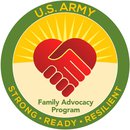About Us
The Department of Defense is committed to addressing and ending domestic abuse. The Family Advocacy Program works to prevent abuse by offering programs to put a stop to domestic abuse before it starts. When abuse does occur, the FAP works to ensure the safety of victims and helps military families overcome the effects of violence and change destructive behavior patterns. FAP staff members are trained to respond to incidents of abuse and neglect, support victims, and offer prevention and treatment.
The FAP works to prevent domestic abuse and child abuse and neglect by providing education and awareness programs for all members of the military community:
Classes, workshops, and seminars: Couples communication, anger management, stress management, effective parenting, and conflict resolution are just a few of the educational programs available to help military families learn how to build positive relationships. The FAP also provides educational programs to leadership and to service members during unit training.
New Parent Support Program: Active duty service members and spouses who have or are expecting a baby may participate in the NPSP. The program offers home visitation, parenting education, and other services to help young families provide a safe and nurturing environment for their children.
Counseling: Sometimes counseling is the best way for individuals and couples to understand and change attitudes, impulses, and patterns of interacting that contribute to hurtful and potentially violent behavior. One-on-one support helps parents develop positive parenting techniques, manage anger, and learn communication skills.
Public awareness campaigns: The FAP works to help communities learn to recognize domestic and child abuse, where and how to report it, and how victims can get help.
When an allegation of abuse or neglect is reported, FAP professionals meet individually with suspected victims, offenders, and other family members to gather information about the allegation and the family's history. This information, along with other evidence, is used to develop recommendations for follow-up action. An important part of the program is collaboration among FAP staff, military units, law enforcement, medical and legal personnel, Family Support Centers, chaplains, and civilian agencies. This coordinated community effort is essential to prevent and respond to abusive behavior in military families.



